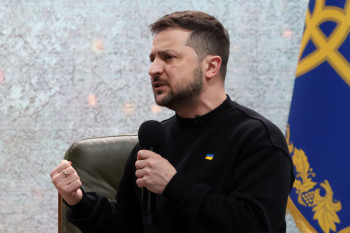Ukraine's military prevented Russian troops from encircling Donetsk Oblast's Bakhmut, but the battlefield situation in the area remains "very difficult," Colonel General Oleksandr Syrskyi, commander of the Ground Forces of Ukraine, said on March 9.
"Here, every move and decision can radically change it (the situation). Every day has the highest value," added Syrskyi. "I appreciate the speed of thinking of the brigade commanders I am working with."
Earlier in the day, Ukraine's Land Forces cited him saying that the importance of holding Bakhmut was "only increasing."
The battle for Bakhmut, a once prosperous industrial city in eastern Ukraine, has been raging for the past seven months. The Russian military is attempting to increase its grip over the entirety of the oblast, around half of which it currently occupies.
Despite the heavy fighting, Ukraine has not withdrawn soldiers from the city.
The General Staff of Ukraine's Armed Forces reported in its evening update that the Russian military "does not stop trying to surround Bakhmut and get further access to the administrative borders of Donetsk and Luhansk regions."
Russian forces are concentrating their efforts on conducting offensives toward Kupiansk in Kharkiv Oblast and Lyman, Bakhmut, Avdiivka, and Shakhtarsk in Donetsk Oblast, the General Staff added.
On March 8, NATO Secretary General Jens Stoltenberg warned that Bakhmut could fall "in the coming days" but that losing the city would not represent a turning point in the war.
On March 6, U.S. Defense Secretary Lloyd Austin also remarked that the fall of Bakhmut would not be a significant setback for the Ukrainian military, adding that the city was more of a "symbolic" than "strategic" value.
Eastern Operational Command spokesman Serhiy Cherevaty responded to these comments on national television on March 9, saying that he appreciated their insight, but NATO did not fully understand the situation on the ground in Bakhmut.










